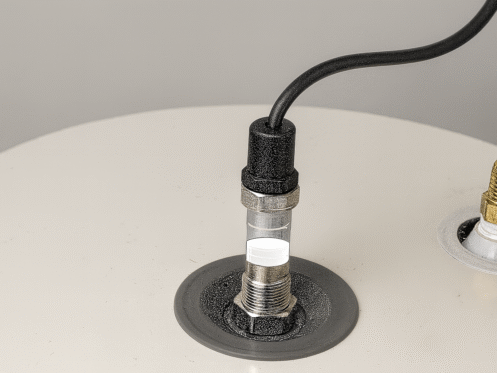Water heaters are one of the hardest-working appliances in your home, quietly providing hot water for showers, dishwashing, and other daily tasks. At the heart of your heater’s longevity is the anode rod, but when it’s time for an upgrade, you may wonder if powered anode rods work better than their traditional counterparts. More importantly, are powered anode rods worth it for Denver households?
In this comprehensive guide, we’ll explore everything you need to know about powered anode rods vs. magnesium rods, including benefits and drawbacks, helping you make an informed decision for your home’s water heating system.
Traditional Anode Rods
Water heater anode rods are cylindrical components typically made from aluminum, magnesium, or zinc. They serve as the main protector of your water heater tank. Through a natural process called galvanic corrosion, the anode rod attracts corrosive elements in the water, preventing them from attacking the steel tank walls.
Traditional water heater anode rods work by being more reactive than the steel tank. As minerals and corrosive elements interact with the rod, it gradually deteriorates, effectively sacrificing itself to protect your water heater. Their effectiveness depends on your local water quality.
In areas with hard water, like many parts of Colorado, aluminum rods tend to perform better due to their durability. Magnesium rods work better in soft water conditions, while zinc rods can help reduce sulfur odors in your water supply. Traditional rods require regular replacement every three to five years. Once they’re completely consumed, your water heater tank becomes vulnerable to corrosion, potentially leading to costly repairs or premature replacement.
Introduction to Powered Anode Rods
Powered anode rods represent a significant advancement in water heater protection technology. Unlike traditional sacrificial anodes that rely on natural galvanic corrosion, powered anode rods work by using electrical current to actively protect your water heater tank.
A titanium or mixed metal oxide probe is connected to an external power supply. By applying a small electrical current, it generates a protective field around the water heater tank. In effect, it can prevent corrosion without the powered anode rod being consumed in the process.
Benefits of Powered Anode Rods
Wondering if powered anode rods are worth it? Consider these key benefits of using powered anode rods vs. magnesium, aluminum, or zinc options.
- Longevity and durability: Powered anode rods last up to 20 years or more, compared to just three to five years for traditional anode rods.
- Superior protection: Powered anode rods provide more consistent protection since they don’t deteriorate over time.
- Water quality improvements: These systems can help reduce sulfur odors, metallic tastes, and discoloration that sometimes occur with traditional anode rods.
- Reduced maintenance requirements: With far less frequent inspection and replacement, powered alternatives significantly reduce maintenance needs and increase convenience.
Drawbacks and Limitations
While there are many reasons why powered anode rods are worth it, they are not without their drawbacks and limitations.
- Higher upfront investment: Including installation, powered anode rods can cost up to 10 times more than traditional options. This upfront investment often pays off over time through reduced maintenance and extended water heater life.
- Electrical requirements: Powered anode rods require a constant electrical connection, though the cost is typically minimal.
- Installation complexity: Installing powered anode rods is more complex than replacing traditional rods. The process requires electrical connections and proper positioning of the control unit.
- Compatibility considerations: Not all water heaters are suitable for powered anode rod installation. Consult with the pros at High 5 to determine the feasibility of installation.
Detailed Comparison: Traditional vs. Powered Anode Rods
When comparing powered anode rods to traditional options, several key differences emerge:
- Lifespan: Conventional anode rods last three to five years in average water conditions, while powered rods can function effectively for up to 20 years.
- Protection: Powered rods maintain consistent protection regardless of water hardness, while aluminum rods lose effectiveness as they deteriorate.
- Maintenance: Traditional anode rods require regular inspection and replacement, while powered rods need minimal maintenance once properly installed.
- Water quality: Aging traditional rods may cause water to become cloudy or develop a metallic taste near the end of their life cycle. Powered rods maintain consistent water quality throughout their operational life.
- Environmental considerations: Powered rods generate less waste over time since they require far less frequent replacement.
Installation and Maintenance
Powered anode rod installation calls for professional expertise to avoid improper electrical connections, inadequate grounding, or system malfunctions that could compromise protection. The installation process involves:
- Completing electrical connections to ensure a proper power supply
- Positioning of the anode and control unit precisely
- Testing to verify system functionality
- Integrating with existing water heater components
Powered anode rods require minimal ongoing maintenance compared to traditional options. Annual system checks can verify proper operation, but the hands-off nature of these systems makes them attractive for homeowners seeking low-maintenance solutions.
Homeowners in the Greater Denver Metro Area should call for a professional service if they notice unusual water quality changes, error lights on the control unit, or unexpected electrical issues.
Need Help Installing a Powered Anode Rod? Contact the Team of Plumbers at High 5
Deciding between traditional and powered anode rods depends on your specific situation, budget, and long-term plans for your water heater. Powered anode rods are worth it for their longevity and consistent protection, but they do require a higher upfront investment.
High 5 Plumbing, Heating & Cooling offers comprehensive plumbing and water heater services that focus on what’s needed and the most effective way to do the job. True to our core values, our plumbing company is upfront about pricing, and our team will recommend the best solution for your home’s needs. Whether you’re considering a powered anode rod upgrade or need assistance with traditional water heater maintenance, contact us today to schedule a consultation and discover how we can help extend your water heater’s life while improving your home’s hot water quality.

